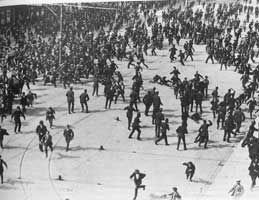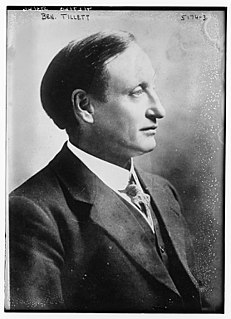Related Research Articles

The Transport and General Workers' Union was one of the largest general trade unions in the United Kingdom and Ireland – where it was known as the Amalgamated Transport and General Workers' Union (ATGWU) to differentiate itself from the Irish Transport and General Workers' Union – with 900,000 members. It was founded in 1922 and Ernest Bevin served as its first general secretary.
The National Transport Workers' Federation (NTWF) was an association of British trade unions. It was formed in 1910 to co-ordinate the activities of various organisations catering for dockers, seamen, tramwaymen and road transport workers.
The Dock, Wharf, Riverside and General Labourers Union (DWRGLU), often known as the Dockers' Union, was a British trade union representing dock workers in the United Kingdom.

The Dublin lock-out was a major industrial dispute between approximately 20,000 workers and 300 employers which took place in Ireland's capital city of Dublin. The dispute lasted from 26 August 1913 to 18 January 1914, and is often viewed as the most severe and significant industrial dispute in Irish history. Central to the dispute was the workers' right to unionise.

The Irish Transport and General Workers Union (ITGWU), was a trade union representing workers, initially mainly labourers, in Ireland.
The Scottish Union of Dock Labourers was a Glasgow-based trade union for waterfront workers. It was formed during the seamen's and dockers' strikes of June–July 1911. Locally, it replaced the National Union of Dock Labourers, which had been formed in Glasgow in 1889 but later became unpopular in that port, finally closing its local branch in February 1910. The president of the SUDL throughout its lifetime was Joe Houghton. The union joined the Transport & General Workers' Union in 1922, but many of its members left in 1932 to form the Scottish Transport and General Workers' Union (Docks).
New unionism is a term which has been used twice in the history of the labour movement, both times involving moves to broaden the trade union agenda. Ben Tillett was a prominent leader of the London Dock strike of 1889. He formed the Dock, Wharf, Riverside and General Labourers' Union in 1889, which had support from skilled workers. Its 30,000 members won an advance in wages and working conditions.

Sir James Sexton CBE was a British trade unionist and politician.
The Scottish Transport and General Workers' Union (Docks) was a trade union representing dock workers in Scotland, principally around Glasgow.
The National Amalgamated Stevedores and Dockers (NASD), sometimes referred to as the National Amalgamated Stevedores' and Dockers' Society, was a trade union in the United Kingdom.

Edward McHugh was an Irish Georgist, trade unionist, Labour activist and social reformer. He spent a great deal of his lifetime engaged in the struggle for social reform not only in Great Britain and Ireland, but also further afield, including spells in America and the Antipodes.

Richard McGhee was an Irish Protestant Nationalist home rule politician. A Georgist Land League and trade union activist, he was a Member of Parliament (MP) in the House of Commons of the United Kingdom of Great Britain and Ireland for more than 20 years.
The National Amalgamated Union of Labour (NAUL) was a general union in the United Kingdom.

Benjamin Tillett was a British socialist, trade union leader and politician. He was a leader of the "new unionism" of 1889 that focused on organizing unskilled workers. He played a major role in founding the Dockers Union, and played a prominent role as a strike leader in dock strikes in 1911 and 1912. He enthusiastically supported the war effort in the First World War. He was pushed aside by Ernest Bevin during the consolidation that created the Transport and General Workers' Union in 1922, who gave Tillett a subordinate position. Scholars stress his evangelical dedication to the labour cause, while noting his administrative weaknesses. Clegg Fox and Thompson described him as a demagogue and agitator grasping for fleeting popularity.

The Belfast Dock strike or Belfast lockout took place in Belfast, Ireland from 26 April to 28 August 1907. The strike was called by Liverpool-born trade union leader James Larkin who had successfully organised the dock workers to join the National Union of Dock Labourers (NUDL). The dockers, both Protestant and Catholic, had gone on strike after their demand for union recognition was refused. They were soon joined by carters, shipyard workers, sailors, firemen, boilermakers, coal heavers, transport workers, and women from the city's largest tobacco factory. Most of the dock labourers were employed by powerful tobacco magnate Thomas Gallaher, chairman of the Belfast Steamship Company and owner of Gallaher's Tobacco Factory.
James O'Connor Kessack was a British trade unionist.
The South Side Labour Protection League was a trade union organising dock porters and stevedores in the United Kingdom.
William Devenay was a British trade unionist and politician.

Thomas McCarthy was a British Irish trade unionist, who became prominent as a leader of dockers in England.
References
- ↑ Report on Trade Unions in 1905-1907. London: Board of Trade. 1909. pp. 82–101.